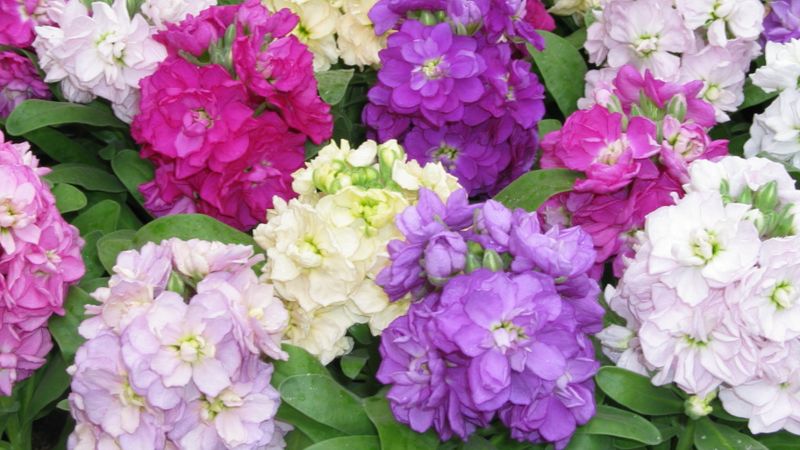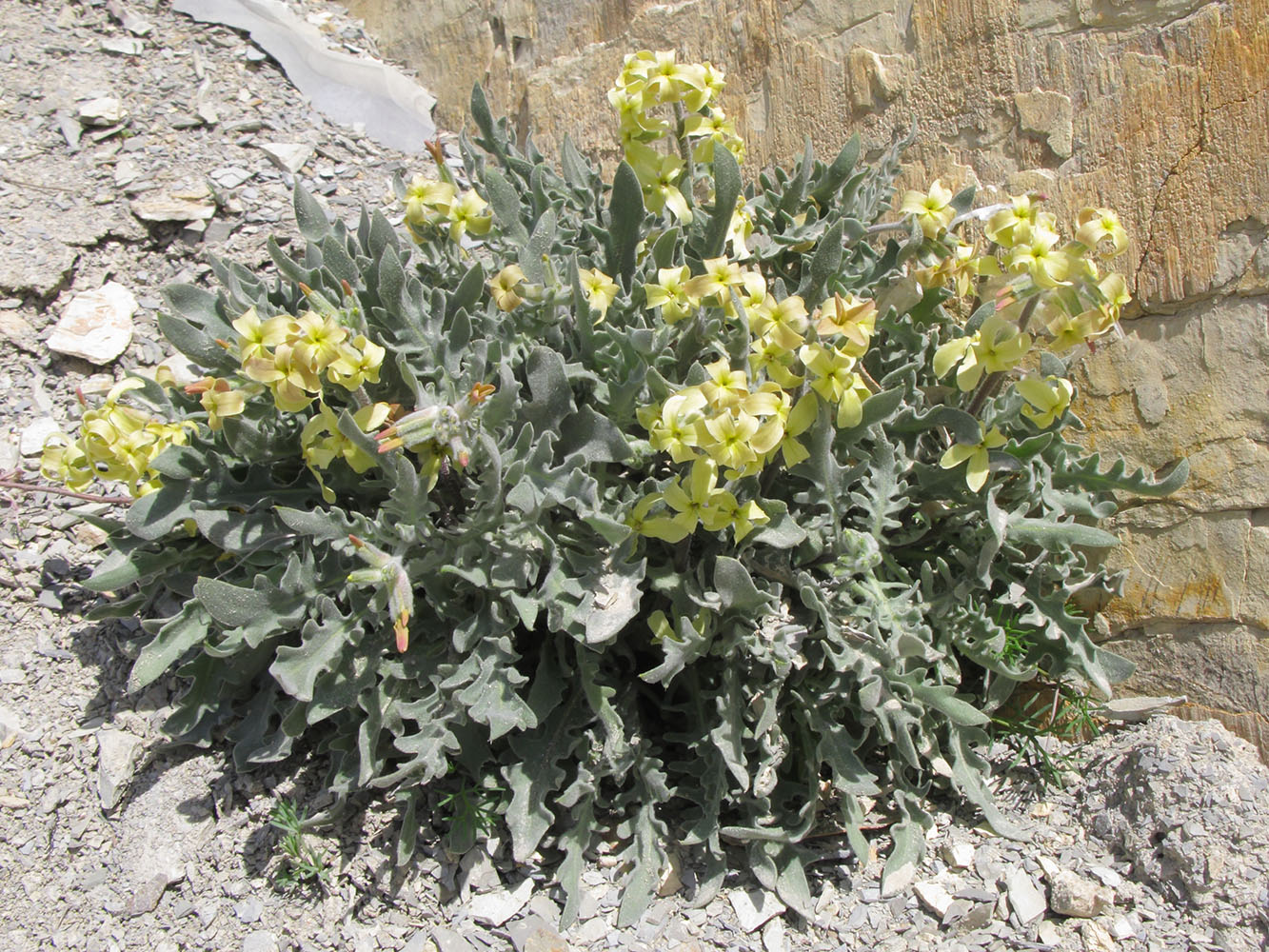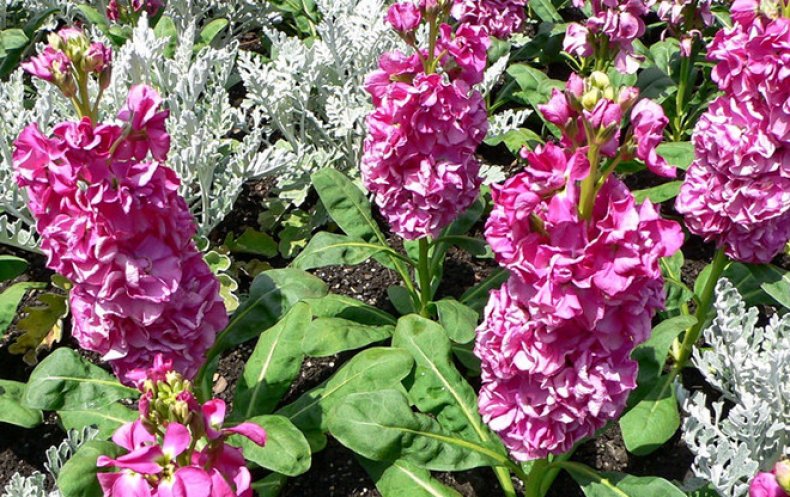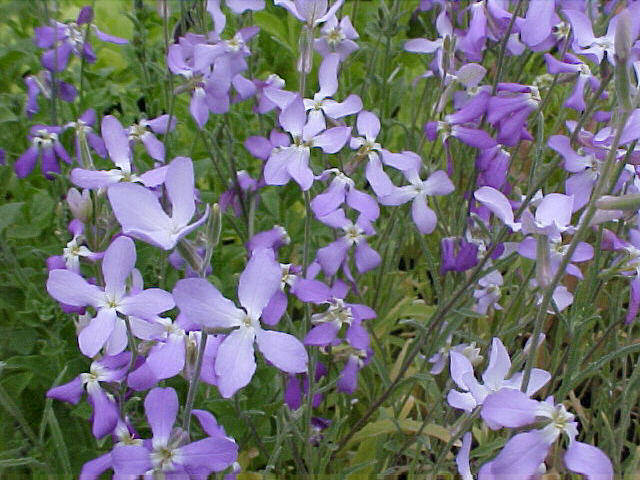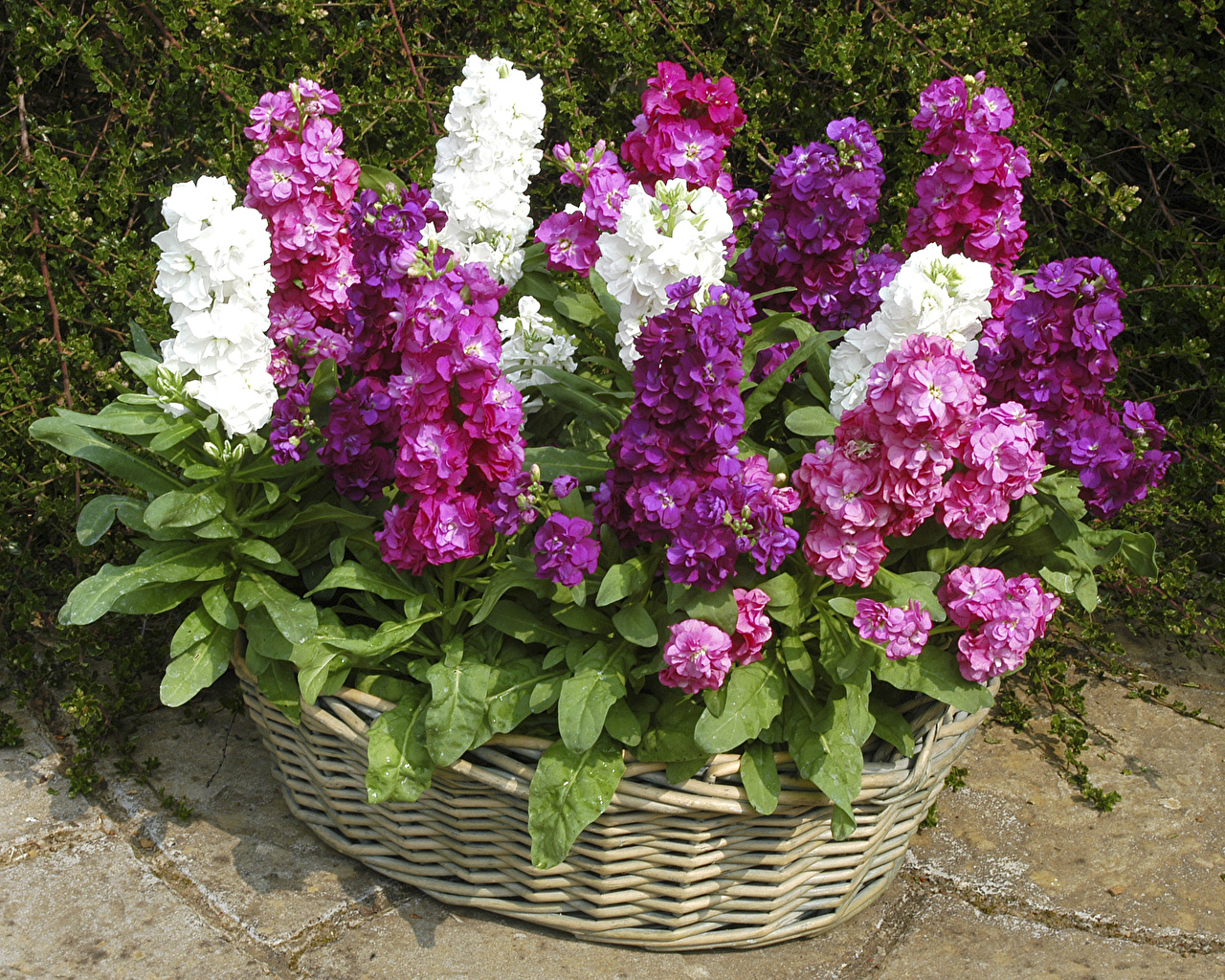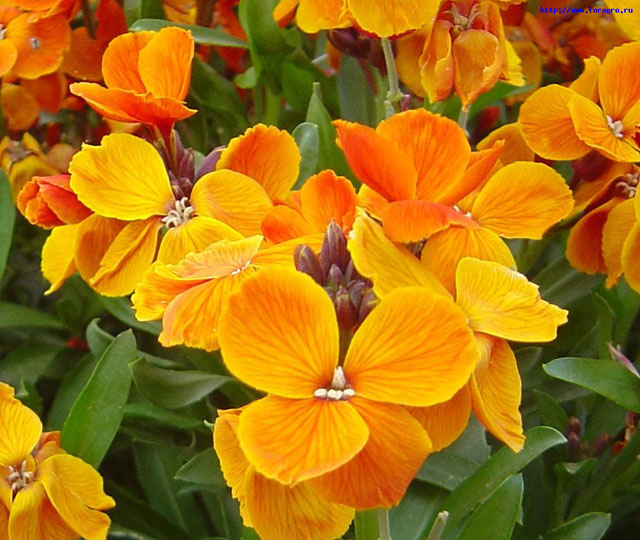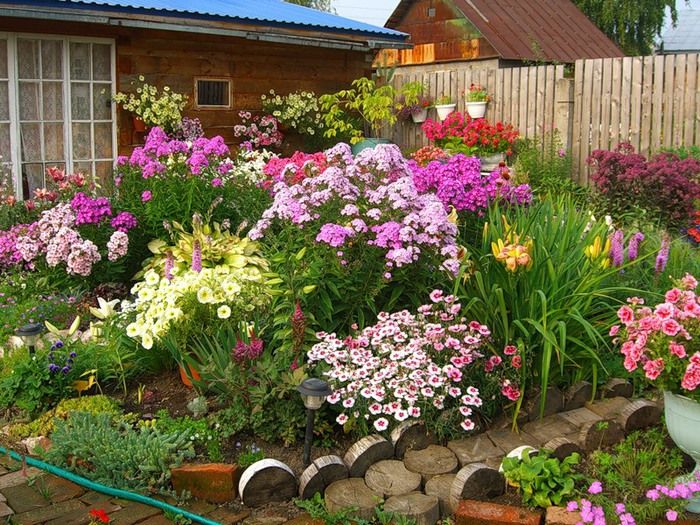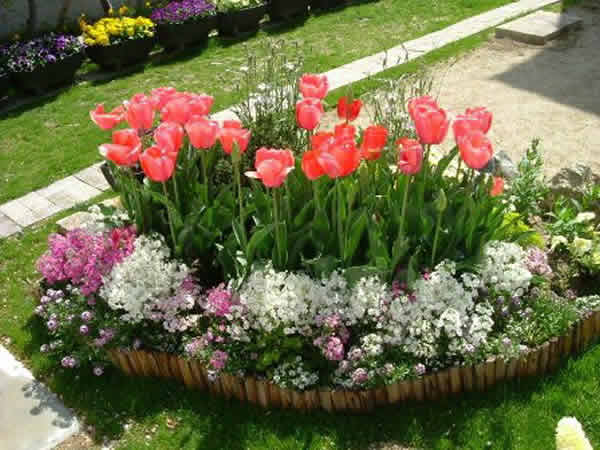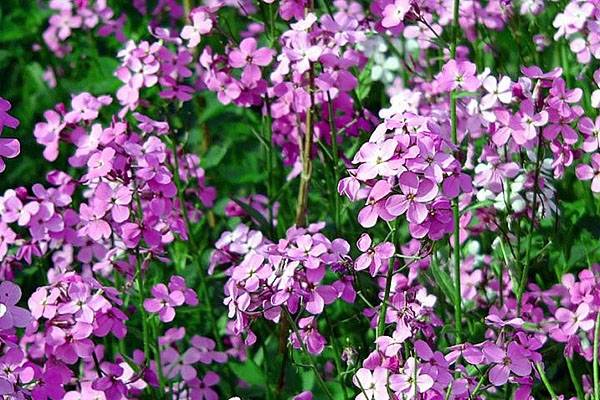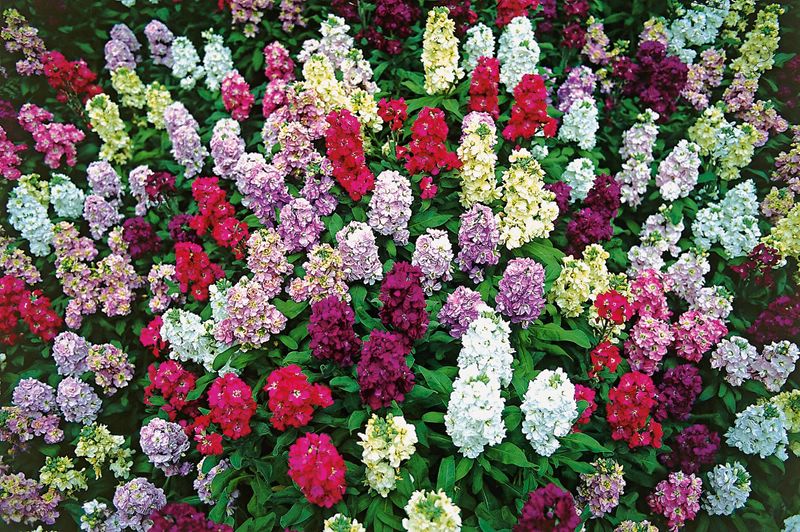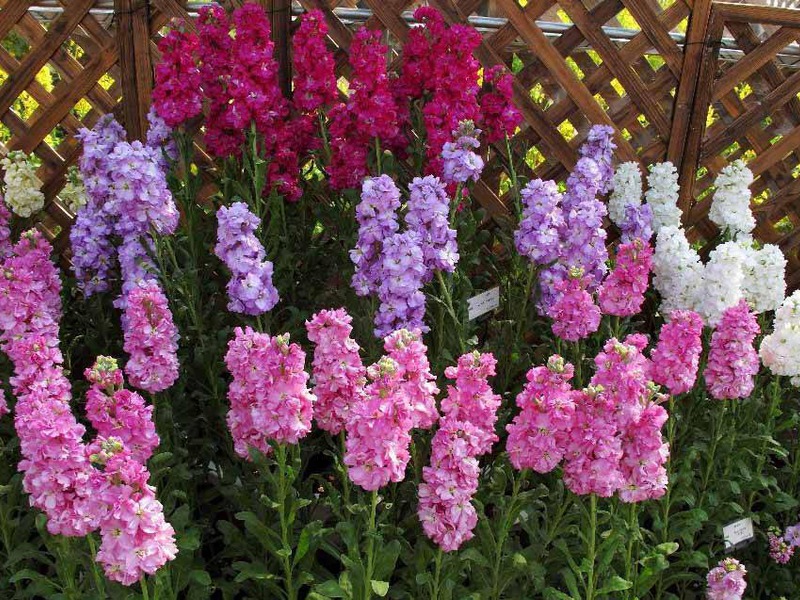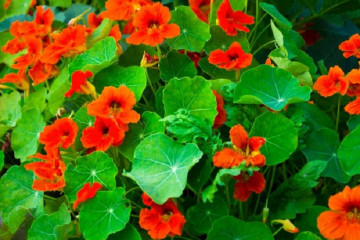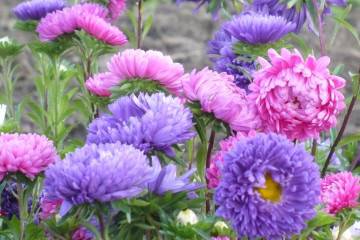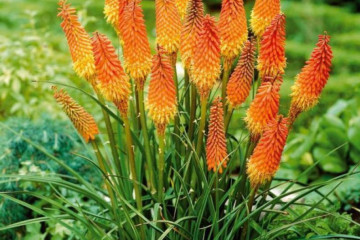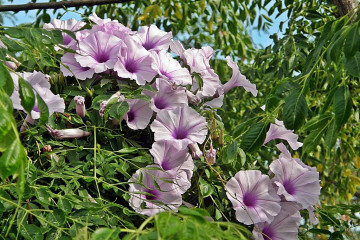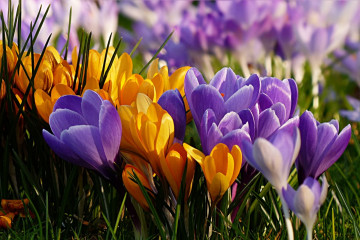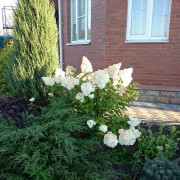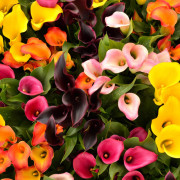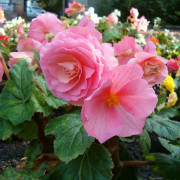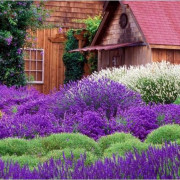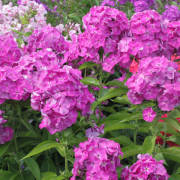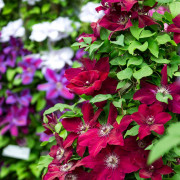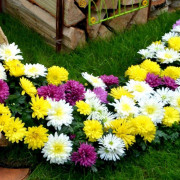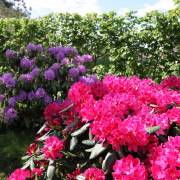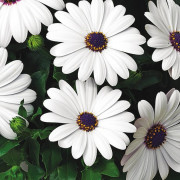Levkoy - planting and care in the open field
Content: [Hide]
Levkoy is a flower with bright petals that will fill the garden with fragrance. Many flower growers dream of growing it in their summer cottage.
Botanical characteristics
Mattiola (Levkoy) is a flowering plant from the Cruciferous family (Cabbage, Brassicaceae). It is a small bush 100 cm high. Straight branches are densely covered with foliage. Below, next to the roots, they harden and stiffen. The plant has long, elongated leaves of a rich green hue. Their edges can be smooth or jagged. Fragrant flowers of unusual shape consist of 4 petals. Their color is incredibly diverse: Levkoy flowers can be white, yellow, red, purple, blue, brown, pink, etc.
Mattiola blooms profusely. Different types and varieties of levkoy are both annual and perennial. The most common annuals are all varieties of summer levkoy. Perennial mattiola is represented by many different types: fragrant, winter, gray-haired, etc.
The word "levkoy" in translation from ancient Greek means "white violet". This flower received its scientific name in honor of the Italian doctor and botanist Pietro Mattioli. The plant is also called "night violet".
Popular species and varieties
There are about 400 known varieties of matthiola. They differ from each other in the color of the petals, the shape of the leaves, the duration of flowering and other characteristics.
Description of species and varieties:
- Levkoy gray-haired (Matthiola incana) - has a branched stem 20-50 cm high, but sometimes there are plants up to 80 cm high.Leaves of a grayish-green color grow in length up to 5-18 cm, and in width - 1-4.5 cm. The stem and leaves are covered with fluff. Flowers are double or simple. They are collected in inflorescences of 10-60 pieces each. Each flower consists of 4 sepals (1-1.2 cm long), 4 petals (2-3 cm long and 1-1.5 cm wide), 6 stamens and a pistil. The color of the petals can be lilac, pink, white, red, purple. The variety "Kustovoy" of gray levkoy is widely known.
- Fragrant levkoy is a rare species listed in the Red Book. It is a perennial plant with a height of 20-50 cm, covered with a dense white fluff. It has yellow or brown petals 2-2.5 cm long. The leaves are located close to the roots.
- Autumn Levkoy - suitable for planting in a greenhouse or in the open field. It is planted in March or April, and it blooms only at the end of summer and blooms until frost.
- Winter - it is desirable to grow it in indoor pots. The seeds must be sown in the middle of summer, then it will begin to bloom next spring. When the weather is warm, the levkoy can be transplanted into the open ground.
- Matthiola bicorny, long-petalled levkoy (matthiola longipetala) - is famous for its extremely strong aroma. It has a straight stem, densely covered with leaves and small flowers of white, blue or light lilac shades.
- Variety Thumbelina is a miniature bush 35 cm high covered with double flowers of various bright colors.
- Summer - ideal for outdoor cultivation. It can be planted in spring and will bloom throughout the summer.
In turn, summer levkoy is divided into several groups:
- Bouquet - inflorescences are located at the same level and form a lush bouquet of thick double flowers with a diameter of 3.5 cm.
- Giant - a wide pyramidal bush, covered with thick leaves and large double flowers.
- Single-stem plants are erect with a single stem 80 cm high. Its diamond-shaped leaves may have wavy edges. Flowers with a diameter of 6 cm bloom in June for a month.
- Pyramidal - large branched bushes, similar in shape to a pyramid. Among them are dwarf, semi-tall and large-flowered giants. They all have bright, lush flowers.
- Quedlinburg are terry varieties with light green leaves. Among them there are tall and undersized, bushy and columnar varieties that can bloom in early summer or autumn.
- Erfurt (short-branched) - bushes are densely leafy and very branchy. Small but numerous flowers delight with their flowering from July to September.
- Large-flowered gigantic tree-like - the stem begins to branch from the middle. The plant reaches 1 meter in height. Dense double flowers with a diameter of 6 cm bloom for 2 summer months.
- Sprawling - a wide bush with spreading branches grows up to 40-60 cm in height. Among them there are remontant, late large-flowered and terry varieties.
Growing from seeds
Such a beautiful and fragrant flower as levkoy will become a magnificent decoration of the garden. Planting and care will require responsibility and careful attention from the grower.
It will take a lot of work, time and effort to grow a levkoy. Growing from seeds is painstaking work, which is why this method of reproduction is rarely resorted to.
When and how to sow
Sowing time is the last days of March or early April. For cultivation in a greenhouse, summer leaves are sown in January. Fall varieties can be sown in July or August.
How to sow:
- Soak each seed in water for 24 hours.
- Wrap the seeds in damp gauze and refrigerate for 2-3 days.
- Prepare the soil in the box: Mix three parts turf and one part sand. Before sowing, the land is watered.
- Make a 50 mm deep groove in the ground, sow seeds and sprinkle them with substrate.
- Cover the box with plastic wrap and put it in a shaded place where the temperature is constantly maintained at 20-22 ℃ above zero.
- The seeds can sprout in 5-14 days.
-
short and small pods;
-
seeds arranged in 2 rows on a pod;
-
fragile weak bushes.
Seedling care
After the sprouts sprout, they are opened by removing the cover film and the box is placed on the windowsill so that the plant is light. Seedlings can be kept at a temperature of 10-12 ℃ above zero.
2 days after the sprouts appear, they are watered. Then you need to wait another 10-12 days until the seedlings get stronger. Then you need to make a pick: each sprout is transplanted into a separate small pot. A drainage hole must be made at the bottom of the dive tank. Then soil is poured there. You will need 2 parts of leafy land, 2 parts of sod land and 1 part of sand. To strengthen the roots of young levkoes, add hydrogel to the soil. Seedlings of late varieties of matthiola are planted immediately in open ground.
When each sprout grows 2 leaves, the plant must be fed. For this, a solution is prepared: 0.3 g of boric acid, 0.3 g of copper sulfate, 0.1 g of manganese sulfate and 0.1 g of zinc sulfate are dissolved in 1 liter of water.
Landing in open ground
Levkoi are transplanted at the end of May.Planting and grooming outdoors will take time. It is advisable to plant seedlings in the evening or on a cloudy day, since bright sunlight can burn them.
You need to choose a bright area where moisture does not stagnate. Soil acidity (pH) should be neutral or slightly alkaline. Sod-loamy or sod-sandy loam soil is ideal.
Levka should not be planted in places where other plants from the Cabbage family used to grow, because they can suffer from a cruciferous flea.
It is necessary to water the ground with a weak solution of potassium permanganate and the preparation "Hom" in order to protect the plant. Then prepare holes 5-10 cm deep at a distance of 15-30 cm from each other. These holes are filled with water, seedlings are planted in them, the roots are covered with earth and tamped tightly.
Watering and loosening the soil
Matthiola is very sensitive to any changes in soil moisture. This plant is difficult to tolerate both drought and stagnant moisture. It is necessary to regularly water the flower at the root with a small amount of water in the morning.
Reproduction methods
Matthiola is propagated by seeds only. They are purchased in a store or harvested from ripe fruits. After the end of flowering, the levkoy gives fruits - small pods filled with seeds. These seeds can be harvested and prepared for planting next year. Terry levkoy varieties, as a rule, do not produce fruit. But such flowers often grow from seeds left by frail plants.
Top dressing and transplanting
In the spring, Matthiola is fed with complex mineral fertilizers. Ash is well suited as a top dressing. When the levkoy blooms, it needs to be additionally fed with potassium-phosphorus fertilizer.
The only transplant that needs to be done is planting seedlings in open ground.
Pests and diseases
Levkoy is a strong, hardy plant, but it also needs to be protected from dangerous infections and insect pests.
Dangers:
- The cruciferous flea is a pest that threatens matthiola. It is necessary to treat the levka with an ash solution three times with a break of 4-5 days between each spraying. With a large number of insects, the flower is treated with insecticides.
- Blackleg is an incurable disease that affects the root and lower part of the stem. For prophylaxis, before planting, the ground is watered with the preparation "Hom"
Occasionally, growers are faced with a problem when there are few Levkoy flowers and they are all very weak. Then it is very important to find out why the levka does not bloom. This happens very rarely. Most often, the reason is poor soil, which lacks fertilizer.
How to prepare for wintering
In cold northern climates, one-year levkoy is most often grown. In the fall, the plant is removed from the ground along with the root and thrown away. Dig up the place of growth. Perennial flowers are transplanted into a tub or pot and put them in the room.
Flowering period and care after
Levkoy blooms for 1-2 months. If you plant several early, middle and late varieties at once, then you can enjoy flowering and aroma all summer and the first half of autumn. During the flowering period, it is worth feeding the levka fertilizer, which contains a lot of phosphorus and calcium.
Matthiola pods turn brown in September or October. Then the seeds are collected. The plant is removed from the ground along with the root and put to dry. Then the seeds are shaken out of the dried pods.
Use in landscape design
Levkoi - flowers are beautiful and bright. They can be grown singly or made into compositions. It will look great in tall flowerpots, hanging pots, flower beds, flower beds. Levkoy can decorate a terrace, balcony, gazebo, veranda and even the shore of a pond.
Levkoy is a wonderful flower that will fill the garden with a magnificent scent. Amateur flower growers are confident in levkoe, because perennial flowers always justify themselves by long flowering. It is not difficult to grow perennial matthiola in a summer cottage. Annuals and winter biennials are kept in indoor pots and pots.
